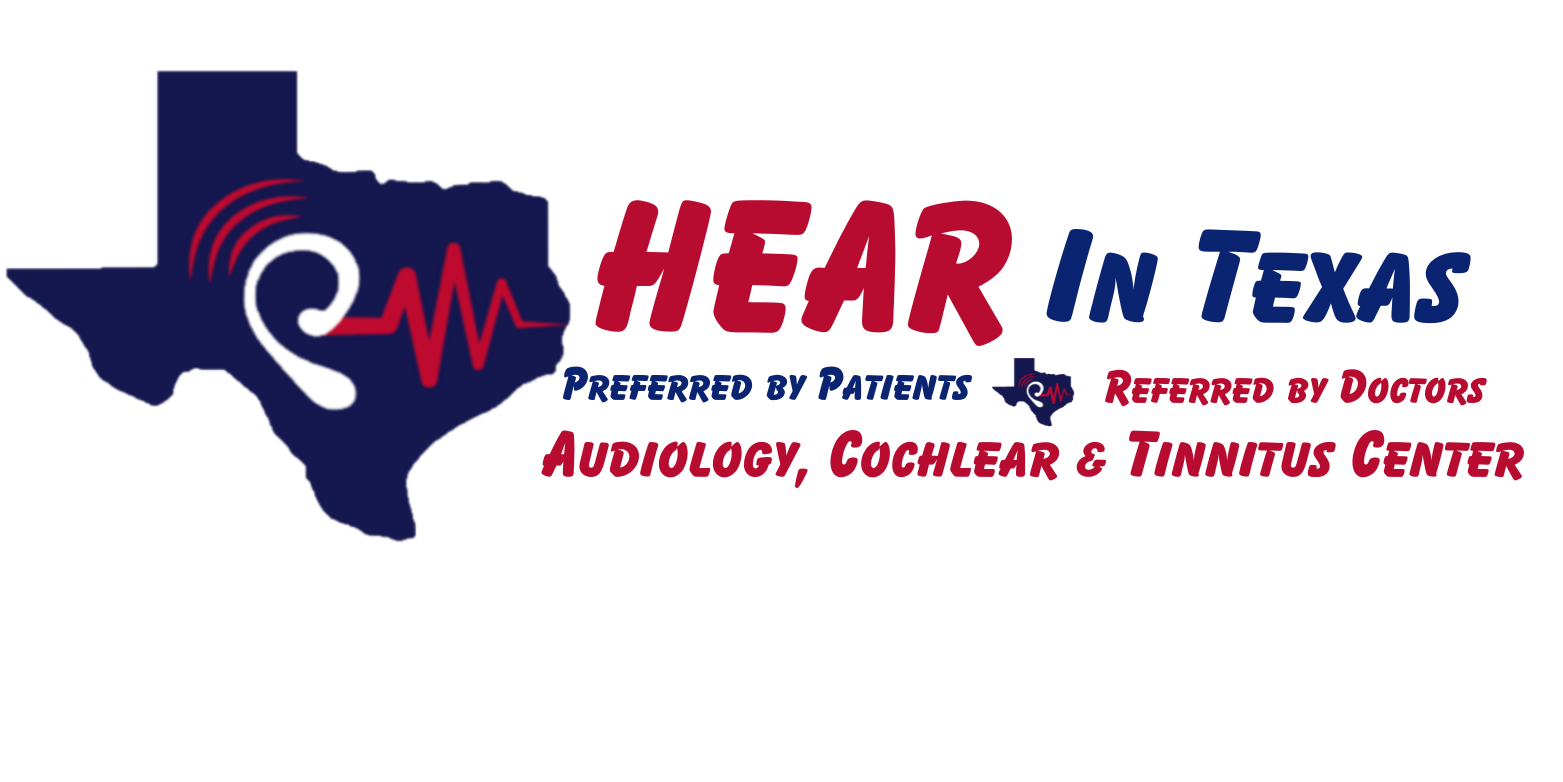HEAR IN TEXAS
Hearing Assessments
The First Step To Better Hearing Is A Comprehensive Hearing Assessment
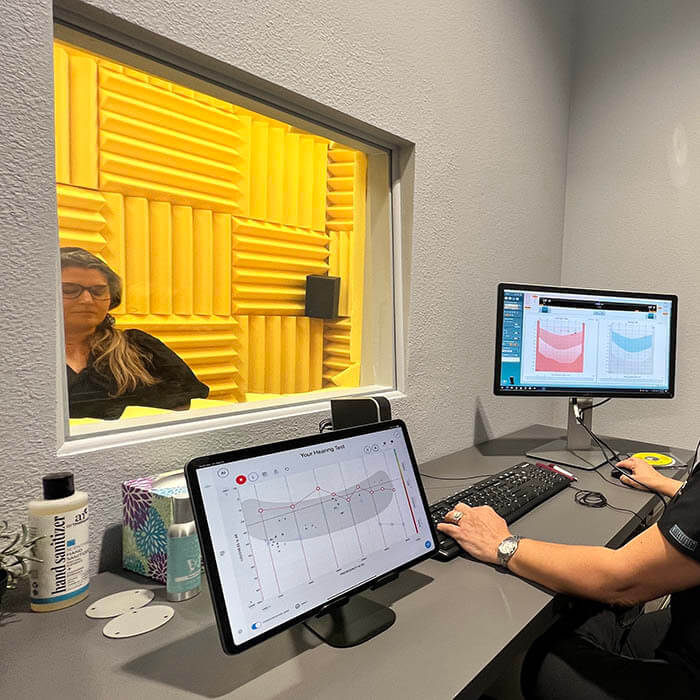
Regular eye tests, dental checkups, annual physicals, and close monitoring of your cholesterol and blood pressure are common health screening priorities, but when was your last hearing test?
As the third most common physical condition behind arthritis and heart disease in the US, you would think that screening for hearing loss would be somewhere near the top of your list.
The sad reality is that most people put off hearing tests until it becomes a struggle to hear or a physician or loved one insists that you have your hearing checked. The average person waits seven years after noticing the first signs of hearing loss before scheduling a hearing test, increasing the amount of damage and severity of a condition that would be easier to treat if addressed sooner by a hearing expert.
Dr. Sally at Hear in Texas is greatly concerned about the hearing health of everyone in our community, and we’d like to encourage you to come in for a comprehensive hearing assessment.

6 Excuses For Putting
Off Hearing Tests
01. My Hearing Loss Doesn’t Bother Anybody.
In truth, unaddressed hearing challenges tend to create relationship issues at home and at work due to communication issues and greater dependence on others to make up for your deficiency. Though this is bad enough, leaving hearing loss untreated also reduces your quality of life by increasing your risk of negative mental health issues like depression and anxiety, as well as physical health problems like cognitive decline, vertigo, balance disorders, and a higher risk of accidents.
02. If I Had A Hearing Problem, I’d Be The First to Know.
If you’ve ever watched paint dry, you know you can’t see the progress until it’s dry. Hearing loss is similar. The change is so gradual that you won’t notice day-to-day changes until you start missing out on certain details during conversations. Consequently, family, friends, and coworkers will probably recognize that you’re struggling with your hearing before you do.
03. I’ll Just Turn Up The Volume.
Volume is only one aspect of hearing impairment. Most problems are related to issues with hearing clarity. For example, an inability to sort out conversations when there is background noise, the decreased capacity to understand women and children, or the inability to distinguish between the consonant sounds th, s, and f, result from hearing clarity rather than problems with volume.
04. Hearing Loss Only Affects Old People.
It is true that the majority of individuals who struggle with their hearing are over 70, but hearing loss can affect people of all ages. At least 10 million adults (6 percent) in the US under age 70, maybe as many as 40 million adults (24 percent), show signs of hearing loss related to exposure to loud noise, while about 17 percent of US teens (ages 12 to 19) also showed signs of noise-induced hearing loss when tested, according to CDC and the National Institute on Deafness and Other Communicative Disorders (NIDCD) studies.
05. I Won’t Learn Anything Useful From Having My Hearing Tested.
The only way to know the truth about your hearing challenges is by seeing an audiologist for a comprehensive hearing assessment. Besides identifying the type and severity of your hearing loss, hearing tests provide the information we need in order to customize a treatment program that addresses your specific hearing needs.
In addition, the early detection of hearing loss allows our hearing care professionals to head off or correct issues that put you at risk of developing debilitating mental, physical, and emotional conditions that threaten your quality of life.
06. I Don’t Know What Happens During a Hearing Test.
Apprehension is a major factor in putting off hearing tests, but that doesn’t have to be the case. A comprehensive hearing assessment conducted by your hearing specialist at Hear in Texas is quick, easy, non-invasive, and provides you with test results during the same visit to our clinic.
What Happens During A Hearing Assessment?
A Conversation About You
Dr. Sally starts all of her consultations with a conversation about you. Not because she’s nosey, but because she enjoys the opportunity to get to know you better and put you at ease.
Our conversation includes questions about your occupation and lifestyle, including hobbies, special interests, and the types of leisure activities you enjoy as well as your medical history, any medications you’re taking, and any history of hearing problems in your family.
From our initial conversation, we’re able to identify how various activities, medical conditions, or genetic predispositions might contribute to your hearing challenges. Among the best practices of audiology we follow, transparency is a must, so we give you time to ask questions or express any concerns related to your hearing loss and the hearing care services we provide.
Helping You to Choose the Right Hearing Technology through our Partnerships with all Manufacturers
With each level of hearing loss and person that we help having their own unique set of circumstances, there is never a “one size fits all” approach.
That’s why we partner with every hearing aid manufacturer to ensure that we can always find the right solution for your unique needs.
This also means that we’re often front of the queue to get our hands on the latest hearing technology to ensure that you always have access to the latest developments.
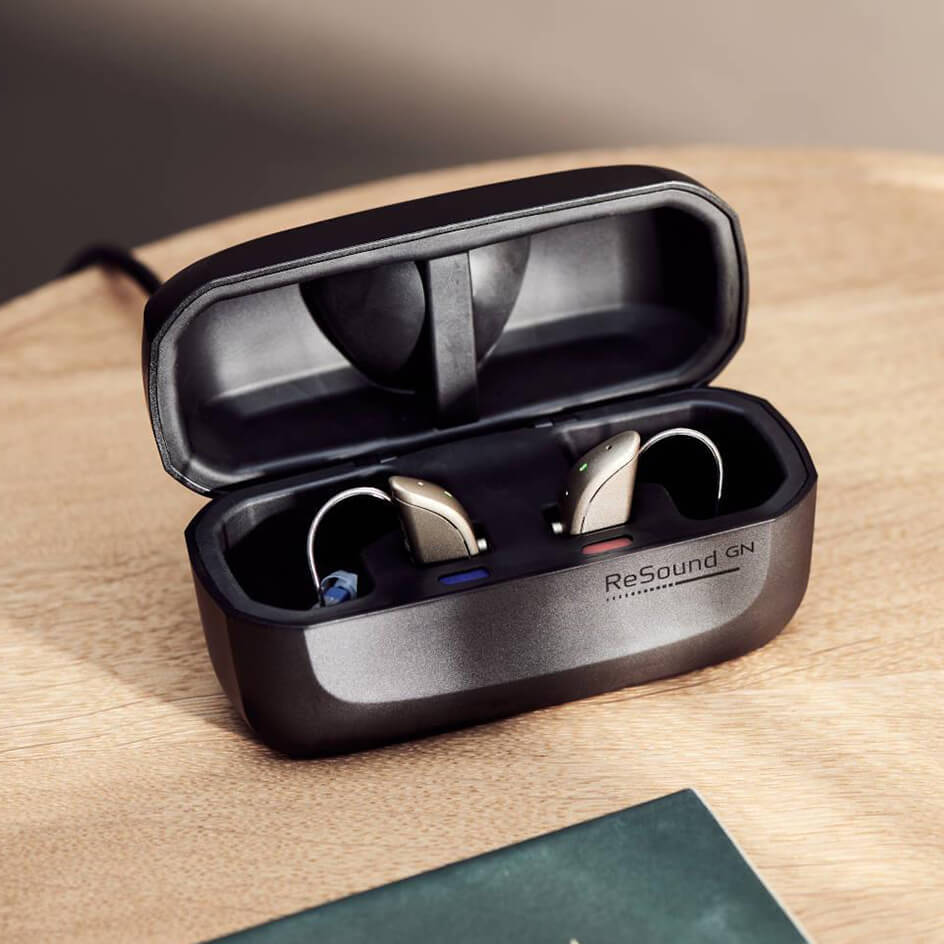
Physical Examination Of Your Ears
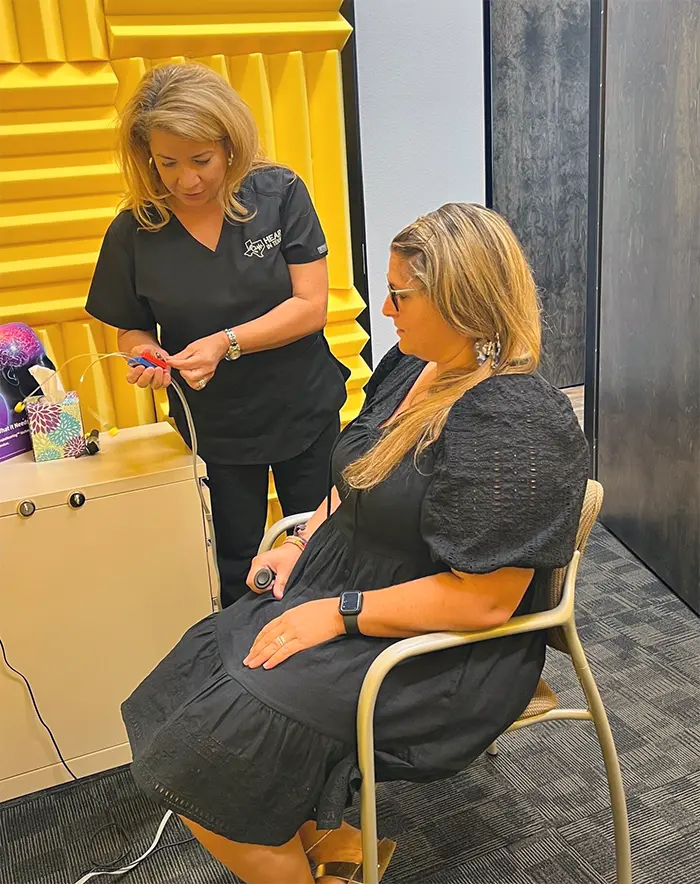
The next phase of a Hear in Texas hearing test is a physical examination using an otoscope (a magnifying glass with a light on a tapered tip). When we look in your ears, we’re evaluating the structure of your ear canal and eardrum.
We’re evaluating your hearing health by looking for any skin conditions, earwax accumulation or the presence of other obstructions in your ear canal, and the health of the eardrum. For some, hearing restoration is as simple as removing earwax, a bug, or some other foreign object, while others involve reducing inflammation or removing a growth with a simple procedure.
Hearing Tests During A Hearing Assessment
Best practices for professional hearing assessments include a full series of hearing tests designed to pinpoint the exact type of hearing loss and its level of severity, including:

Tympanometry
Tympanometry is how our audiologist evaluates the middle ear. We’re looking for negative pressure that occurs in your ears whenever you have allergies, a cold, or fluid behind the eardrum. Like the otoscopy, you’ll just sit still and relax while your audiologist performs the examination, which will include a short burst of air into your ear canal.
Pure Tone Audiometry
Establishing your hearing thresholds, which are the softest and loudest sounds you can hear at various frequencies, is the purpose behind pure tone audiometry. For this test, your audiologist will seat you in a soundproof booth and fit you with a set of headphones.
We’ll ask you to respond each time you hear the tones transmitted through your headphones. In addition to helping identify areas of hearing loss, this test provides data for programming hearing aids, should they be necessary to help you hear better.
Word Recognition Testing
For word recognition testing, your audiologist will transmit spoken words at various pitches and volumes through your headphones instead of tones. You will be asked to repeat or respond to whatever you hear in order to help identify how well you understand speech.
This test might also include the transmission of background noise along with speech in order to simulate various real-world hearing environments. Your audiologist will be able to determine the degree of hearing loss along with how you are apt to do with amplified speech.
Bone Conduction Testing
You’ll be fitted with a headband, known as a bone conduction vibrator, for the bone conduction test. The headband allows us to bypass the hearing pathway and transmit sounds directly to your inner ear, or cochlea, which helps us rule out or confirm sensorineural hearing loss.
Otoacoustic Emissions
Otoacoustic emissions, or OAEs, are vibrations that occur when sound reaches the cochlea. Your audiologist will place a probe in your ear in order to measure these vibrations. This test identifies issues associated with how the hair cells in the cochlea transmit the sound signals to the brain and can be used to evaluate babies through adults.
Play Audiometry for Children
When working with children between the ages of 2 and 5, our audiologist does her best to help them relax and feel comfortable during their hearing assessment. One of the ways we’re able to do this includes the use of games, such as placing a peg in a hole or putting a block in a bucket, every time the child is able to hear a tone or speech. Though young children are pretty unpredictable, we’re successful most of the time.
Discussing Your Results
To wrap up a comprehensive hearing assessment, your audiologist will sit down with you and discuss your test results. In addition to explaining what the results of each test mean, Dr. Sally will provide you with the various options necessary to improve your hearing, whether hearing protection for work or certain activities and hobbies, changes to medications or lifestyle habits, or the need for hearing aids.
Regardless of the outcome of your results, our best practices include asking for your input during this process because, for us, the foundation of a viable hearing care partnership begins with honesty and trust.
Speech In Noise testing
Speech-in-Noise (SIN) testing is an audiology exam that measures how well someone can understand speech when background noise is present. Unlike a standard hearing test, which checks hearing in quiet conditions, SIN testing simulates real-world listening—such as following a conversation in a restaurant or crowded room. The results help audiologists evaluate not just hearing sensitivity, but also listening ability in challenging environments, and guide the selection or fine-tuning of hearing aids and other treatment options.

Your Journey To Better Hearing
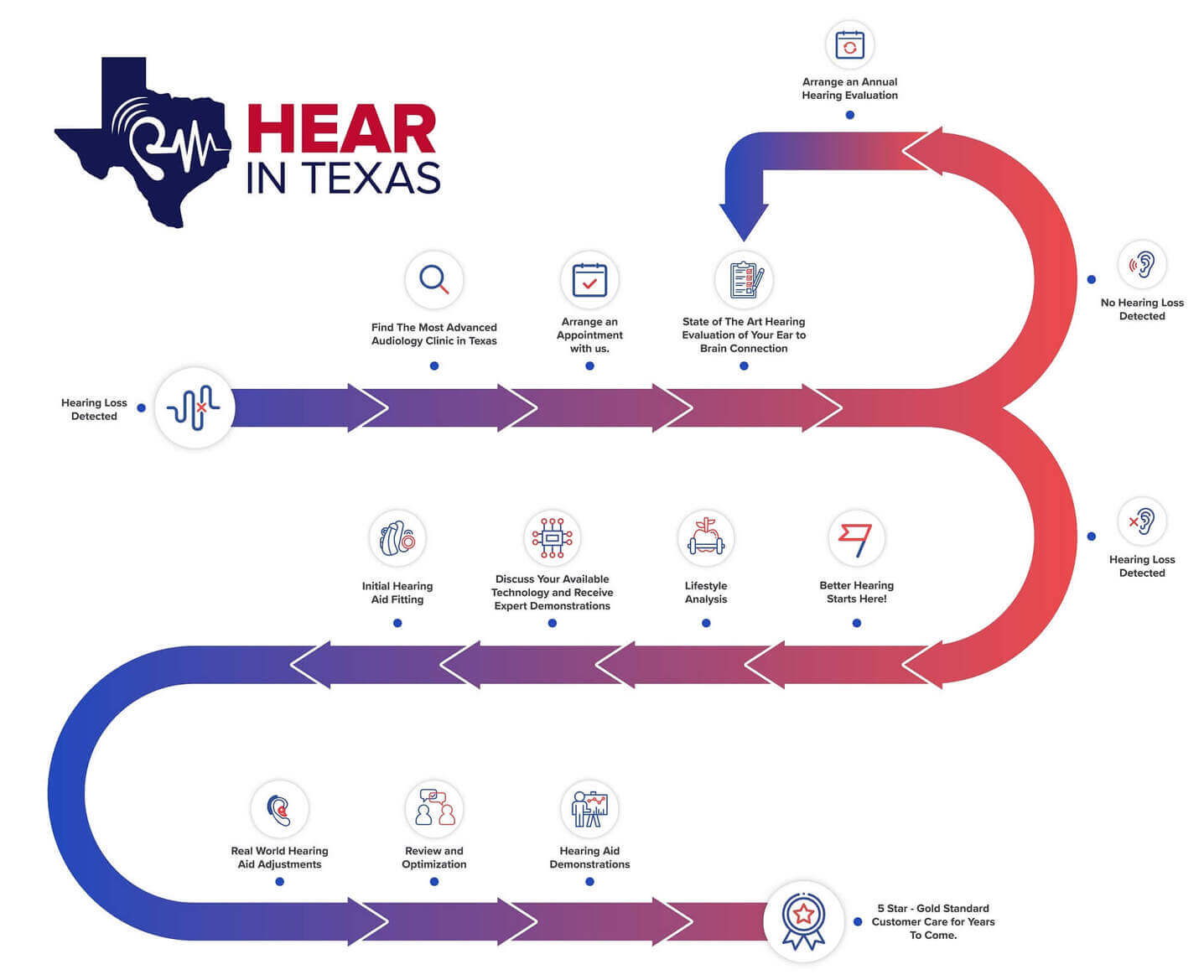
Hearing Health Resources
Blog Posts


How Hear in Texas Supports Veterans With Hearing Loss
New Blog Post DescriptionHonoring Veterans With Accessible Hearing Care At Hear in Texas, we hold a deep appreciation for the sacrifices that veterans have made for our country. As a veteran-owned bus... ...more
Hearing Loss ,Patient Resources &Veterans
June 24, 2025•3 min read

Four Ways to Optimize Your Hearing in 2025
Your hearing health is a cornerstone of your overall well-being. Staying informed about the latest advancements in audiology can help you make empowered decisions about your hearing care. Optimizing... ...more
Patient Resources ,Hearing Aids
May 05, 2025•3 min read
Request A Callback
If you have a question or would like to speak to Dr. Sally to receive advice about your hearing or a loved one’s hearing, then you can request a callback.
You will then receive a phone call to discuss your needs, answer any questions that you may have, and offer no-obligation support/advice. It would be wonderful to connect!
Don’t want to wait? Call us at: (830) 360-2000
If you have a question or would like to speak to Dr. Sally to receive advice about your hearing or a loved one’s hearing, then you can request a callback.
You will then receive a phone call to discuss your needs, answer any questions that you may have, and offer no-obligation support/advice. It would be wonderful to connect!
Don’t want to wait? Call us at:
© Copyright 2025 Hear in Texas. All Rights Reserved. Designed by Topline

